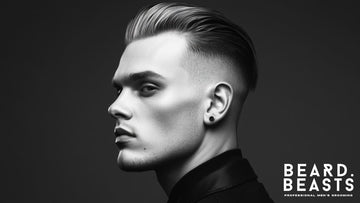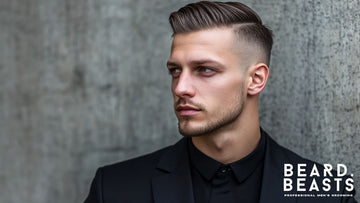What Does Shaving Cream Do? Benefits, Tips, and Best Practices
Ever wondered, what does shaving cream do and why it's essential for a smooth shave? Shaving cream softens hair, provides lubrication, hydrates, and protects your skin, making your shaving experience more comfortable and effective. In this article, we'll explore the benefits of shaving cream, how to use it properly, and tips for choosing the right one for your skin type. Transform your shave with these valuable insights!
What is Shaving Cream?
Shaving cream is a specially formulated product designed to make shaving a smoother and more comfortable experience. But what does shaving cream do? Let's dive into its definition, composition, and the different types available.
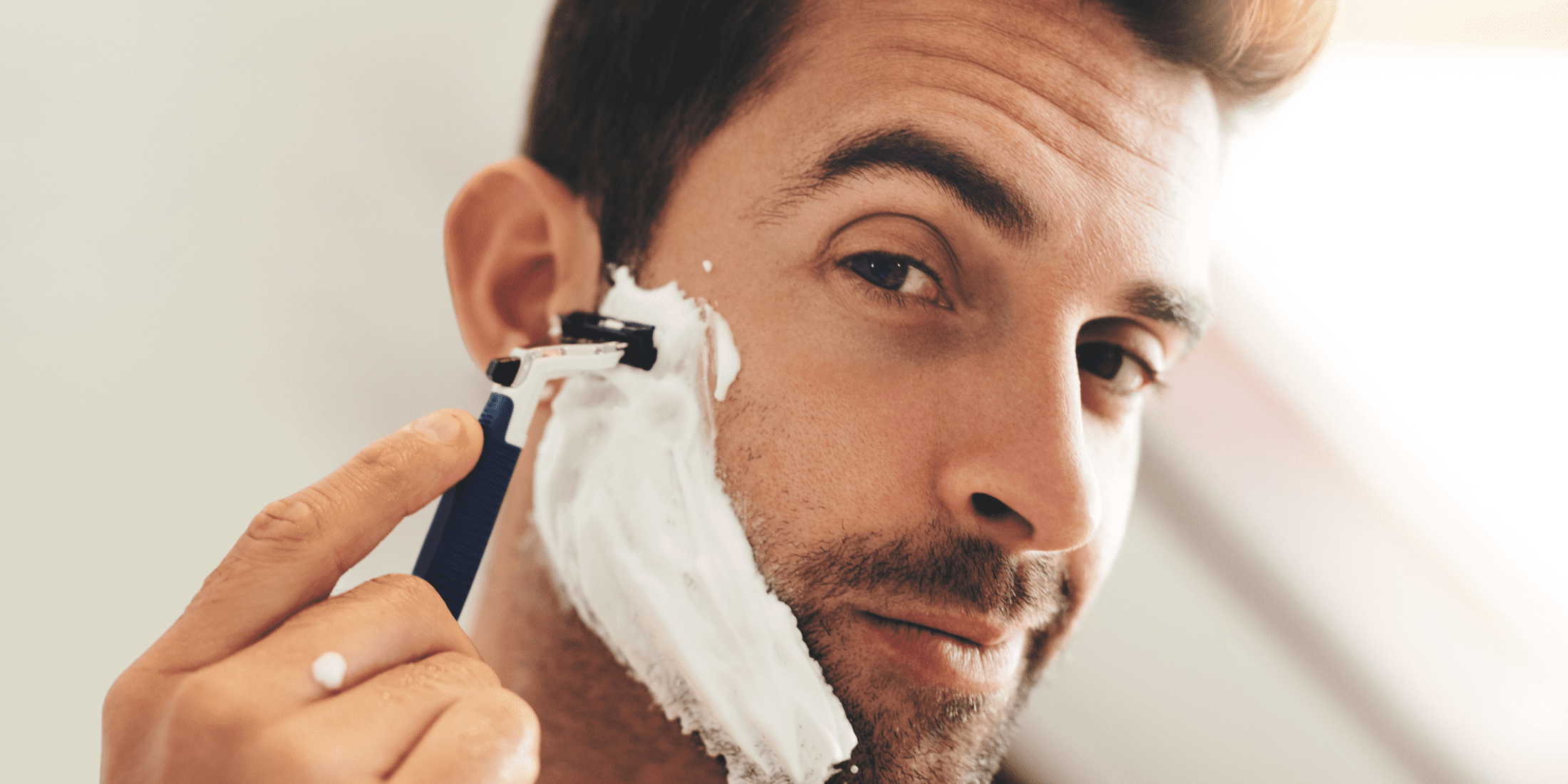
Definition and Composition of Shaving Cream
Shaving cream is a substance applied to the skin to prepare it for shaving. Its main purposes are to:
- Soften the hair: Making it easier to cut.
- Lubricate the skin: Reducing friction between the razor and your skin.
- Hydrate the skin: Preventing dryness and irritation.
Composition: Most shaving creams contain a combination of water, oils, surfactants, and emollients. Here's a quick breakdown of these components:
- Water: Helps hydrate and soften the hair.
- Oils: Provide lubrication to let the razor glide smoothly.
- Surfactants: Create the lather that lifts hair and ensures even coverage.
- Emollients: Moisturize and soothe the skin.
Some shaving creams also include additional ingredients like aloe vera, vitamin E, and essential oils for added skin benefits.
Types of Shaving Creams
When it comes to choosing a shaving cream, there are a few different types to consider. Each has its own unique properties and benefits:
-
Foams
- Quick and Easy: Shaving foam is popular for it's convenience. They come in pressurized cans and dispense a ready-to-use lather.
- Light Texture: The airy consistency spreads easily and rinses off quickly.
- Best For: Those who prefer a no-fuss, quick shave.
-
Gels
- Clear and Precise: Shaving gel often comes out as a clear or slightly tinted gel that lathers upon application.
- Great for Detailing: Ideal for those who need to see exactly where they're shaving, like shaping a beard or mustache.
- Hydrating: Many gels contain added moisturizers for extra hydration.
-
Creams
- Rich and Luxurious: Traditional shaving creams are thicker and often require a shaving brush to create a rich lather.
- Deep Moisturization: Provides a closer, more comfortable shave with added skin care benefits.
- Best For: Those with sensitive or dry skin who appreciate a more indulgent shaving routine.
By understanding what shaving cream is and the different types, you can choose the best product to make your shaving routine more effective and enjoyable.
What Does Shaving Cream Do?
Are you wondering what does shaving cream do beyond just looking foamy and smelling nice? Shaving cream plays several important roles in your shaving routine, making the process easier and more effective. Let's break it down!
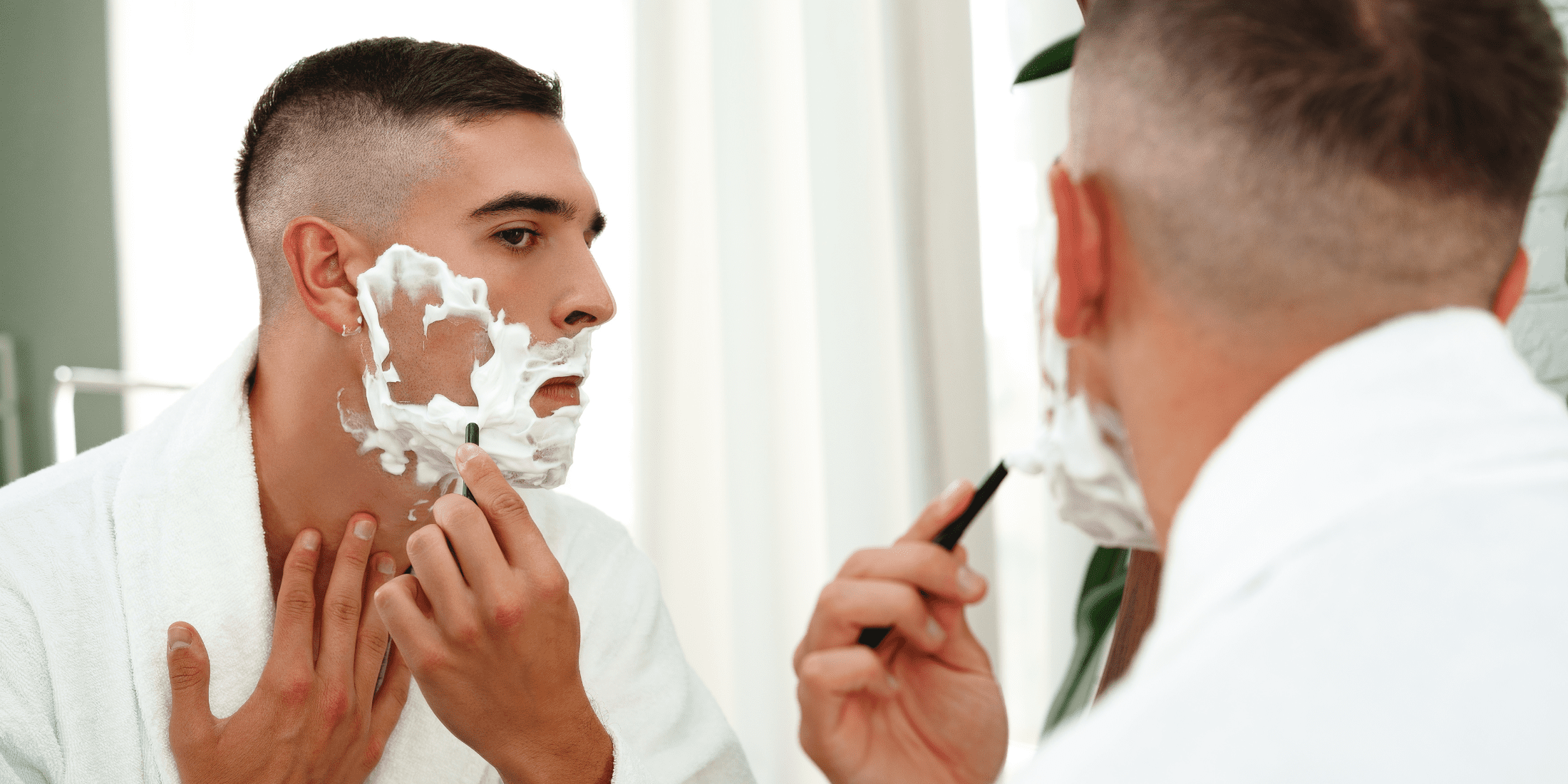
The Key Functions of Shaving Cream
-
Softens the Hair
- Preparation: Shaving cream helps to soften the coarse hair on your face or body, making it easier to cut.
- Closer Shave: Softer hair means you can get a closer, smoother shave with less effort.
-
Lubricates the Skin
- Smooth Glide: The creamy texture of shaving cream creates a slick surface that allows the razor to glide effortlessly.
- Reduces Friction: This lubrication minimizes the friction between the razor and your skin, reducing the risk of nicks and cuts.
-
Hydrates the Skin
- Moisture Lock: Shaving cream helps to lock in moisture, keeping your skin hydrated during the shave.
- Post-Shave Benefits: Well-hydrated skin is less likely to become dry and irritated after shaving.
-
Protects the Skin
- Barrier Creation: By forming a protective layer over your skin, shaving cream reduces the risk of irritation and razor burn.
- Soothing Ingredients: Many shaving creams contain soothing ingredients like aloe vera and vitamin E, which help to calm the skin.
-
Exfoliates the Skin
- Gentle Exfoliation: While you shave, the shaving cream helps to remove dead skin cells, leaving your skin feeling smooth and refreshed.
- Clearer Complexion: Regular exfoliation can lead to a clearer, brighter complexion.
Benefits of Using Shaving Cream
Using shaving cream isn't just about avoiding razor burn—it's about enhancing your entire shaving experience. Here are some of the key benefits:
- Prevents Irritation: The protective barrier and lubrication significantly reduce the chances of skin irritation.
- Enhances Shaving Efficiency: A smoother surface allows for a quicker and more effective shave.
- Skin Care Perks: Many shaving creams are enriched with beneficial ingredients that nourish your skin.
Fun Facts
- Did you know? Using a good quality shaving cream can extend the life of your razor blades by reducing wear and tear.
- Tip: Always let the product sit on your skin for a minute or two before shaving. This gives it time to soften the hair and prep the skin.
By now, you should have a clear understanding of what shaving cream does and why it's an essential part of your shaving routine. From softening and lubricating to protecting and hydrating, this product is your skin’s best friend when it comes to achieving a smooth, comfortable shave.
So, next time you reach for your razor, make sure you’re also reaching for that trusty can or tube of shaving cream!
How to Use Shaving Cream Effectively
Now that you know what shaving cream does, let’s talk about how to use it effectively. A proper application can make a big difference in your shaving experience. Follow this step-by-step guide to get the most out of your shaving cream.
Step-by-Step Guide on Applying Shaving Cream
-
Prepare Your Skin
- Cleanse First: Wash your face with warm water and a gentle cleanser to remove any dirt and oil.
- Warm Up: Use warm water to open your pores and soften your hair. You can even apply a warm, damp towel to your face for a minute or two.
-
Dispense the Shaving Cream
- Foam or Gel: If you're using foam or gel, dispense a small amount (about the size of a walnut) into your hand.
- Cream: If you're using a traditional shaving cream, squeeze out a similar amount into your palm or use a shaving brush for better lathering.
-
Apply to Your Skin
- Hand Application: Rub the product between your hands to create a lather, then apply it evenly to the area you plan to shave.
- Brush Application: If using a brush, swirl it in a circular motion over the cream to create a rich lather, then apply it to your face in circular motions.
-
Let It Sit
- Wait a Minute: Allow the shaving cream to sit on your skin for about a minute. This gives it time to soften the hair and prep your skin for shaving.
-
Shave Carefully
- Use a Sharp Razor: Always use a sharp, clean razor to avoid irritation and cuts.
- Short Strokes: Shave in short, gentle strokes, rinsing the razor frequently to remove hair and cream buildup.
-
Rinse and Moisturize
- Cool Water Rinse: Rinse your face with cool water to close your pores.
- Aftershave or Moisturizer: Apply an aftershave to soothe and hydrate your skin.
Tips for Maximizing the Benefits of Shaving Cream
- Use the Right Amount: Too little cream won’t provide enough lubrication, while too much can be wasteful.
- Shave After a Shower: The steam from a shower helps to soften the hair and open your pores, making shaving easier.
- Replace Blades Regularly: Dull blades can cause irritation and cuts, so change them regularly.
Common Mistakes to Avoid
- Skipping the Prep: Not prepping your skin properly can lead to a rough shave and irritated skin.
- Using Cold Water: Cold water doesn’t soften the hair or open pores as effectively as warm water.
- Applying Too Much Pressure: Pressing too hard with the razor can cause nicks and irritation. Let the razor do the work.
By following these steps and tips, you can make sure you’re using this product effectively and getting the best possible shave. Remember, knowing what does shaving cream do is just the first step—using it correctly is where the magic happens. Enjoy your smooth, comfortable shave!
Choosing the Right Shaving Cream for Your Skin Type
Selecting the perfect product can make all the difference in your shaving experience. Different skin types have unique needs, so let's explore how to choose the best product tailored to your skin. This will ensure you get the most out of what shaving cream does for you!
Different Skin Types
-
Sensitive Skin
- Characteristics: Prone to redness, irritation, and razor burn.
- Recommendations: Look for shaving creams labeled as hypoallergenic or for sensitive skin. Ingredients like aloe vera, chamomile, and vitamin E are soothing and help reduce irritation.
- Avoid: Alcohol, strong fragrances, and harsh chemicals.
-
Oily Skin
- Characteristics: Excess oil production, often leading to acne and clogged pores.
- Recommendations: Choose a lightweight product with non-comedogenic properties (won't clog pores). Ingredients like tea tree oil or witch hazel can help control oil.
- Avoid: Heavy, greasy formulations and products with excessive oil content.
-
Dry Skin
- Characteristics: Flaky, tight, and prone to cracking or itching.
- Recommendations: Opt for a moisturizing shaving cream that contains hydrating ingredients like glycerin, shea butter, or coconut oil. These will help to lock in moisture and soothe dryness.
- Avoid: Shaving creams with alcohol or astringents that can further dry out your skin.
-
Combination Skin
- Characteristics: A mix of oily and dry areas, typically an oily T-zone (forehead, nose, and chin) with dry cheeks.
- Recommendations: Use a balanced product that provides moisture without being too heavy. Ingredients like jojoba oil or hyaluronic acid can offer hydration without making the skin oily.
- Avoid: Products that are too rich or too drying, as they can exacerbate both oily and dry areas.
Recommendations for Choosing the Best Product
- Read Labels Carefully: Always check the ingredients list. Look for beneficial ingredients that suit your skin type and avoid potential irritants.
- Patch Test: If you're trying a new product, do a patch test on a small area of your skin to ensure you don’t have an allergic reaction.
- Seek Reviews and Recommendations: Look for reviews from others with a similar skin type or ask for recommendations from friends or professionals.
By understanding your skin type and choosing the right product, you can maximize the benefits and truly appreciate what shaving cream does for your skin.
Shaving Cream vs. Alternative Shaving Products
When it comes to shaving, there are several products you can use besides this product. Let’s compare what does shaving cream do with other popular shaving products like shaving soap, oil, and gel. Understanding the pros and cons of each will help you decide which one suits your needs best.
Shaving Cream
-
Pros:
- Easy to use
- Provides excellent lubrication
- Hydrates and protects the skin
-
Cons:
- Can be more expensive than some alternatives
- May contain synthetic ingredients
Shaving Soap
-
Pros:
- Traditional and often made with natural ingredients
- Can last longer than creams and gels
- Great for achieving a rich, thick lather with a brush
-
Cons:
- Requires a shaving brush and bowl for lathering
- Can be time-consuming to prepare
- Best For: Those who enjoy a classic, ritualistic shaving experience and have time to lather.
Shaving Oil
-
Pros:
- Provides excellent lubrication and a close shave
- Good for sensitive skin as it reduces friction
- Can be used alone or under shaving cream/gel
-
Cons:
- Can be messy and leave an oily residue
- Less visible than creams or gels, which may make it harder to see where you've shaved
- Best For: Those with sensitive skin or those who prefer a minimalist approach.
Shaving Gel
-
Pros:
- Clear versions allow for precise shaving, great for detailing
- Often provides a cooling effect
- Easy to rinse off
-
Cons:
- Can be less moisturizing than creams
- May contain more synthetic ingredients
- Best For: People who need to see their skin while shaving, such as when shaping facial hair.
Situations Where One Might Prefer an Alternative
- Traveling: Shaving oil is compact and won't spill, making it ideal for travel.
- Sensitive Skin: Shaving oil or hypoallergenic shaving cream can be gentler on sensitive skin.
- Traditional Shave: Shaving soap with a brush offers a nostalgic, luxurious shaving experience.
- Detailing Facial Hair: Shaving gel’s transparency is perfect for precise shaving.
Ultimately, the best shaving product depends on your personal preferences and skin type. Whether you choose shaving cream for its convenience and hydration, shaving soap for a traditional touch, shaving oil for sensitivity, or shaving gel for precision, understanding what does shaving cream do and how it compares to alternatives will help you make the best choice for your shaving routine.
Frequently Asked Questions
Shaving can bring up a lot of questions, especially when it comes to what does shaving cream do and how to use it effectively. Here are some of the most frequently asked questions about this product to help you out.
Is it Necessary to Use Shaving Cream?
Short Answer: Yes, using shaving cream is highly recommended. Why?
- Lubrication: It reduces friction between your razor and skin, helping to prevent nicks and cuts.
- Hydration: It keeps your skin and hair hydrated, making the shaving process smoother and more comfortable.
- Protection: It also creates a protective barrier, reducing the risk of irritation and razor burn.
What Happens if You Don't Use Shaving Cream?
Skipping Shaving Cream:
- Increased Irritation: Shaving without cream can lead to more skin irritation and razor burn.
- Higher Risk of Cuts: Without lubrication, the razor is more likely to nick and cut your skin.
- Dryness: Your skin can become dry and flaky due to the lack of hydration and protection.
Pro Tip: If you run out of this product, you can use alternatives like conditioner or a gentle soap, but they might not offer the same level of protection and lubrication.
Does Shaving Cream Give You a Closer Shave?
Yes, it does!
- Softens Hair: It softens the hair, making it easier for the razor to cut through it.
- Smooth Glide: The lubrication allows the razor to glide more smoothly over your skin, resulting in a closer shave.
- Prevents Drag: It reduces the drag on your razor, allowing for a more precise and closer cut.
Is it Safe to Use Shaving Cream on Pubic Hair?
Yes, but with some precautions.
- Choose the Right Product: Use a product specifically designed for sensitive areas or one that is labeled as hypoallergenic.
- Do a Patch Test: Before applying it to a larger area, do a patch test to ensure you don’t have any adverse reactions.
- Shave Carefully: Use a clean, sharp razor and shave in the direction of hair growth to minimize irritation.
Tips for Shaving Pubic Hair:
- Hydrate the Skin: Make sure to hydrate your skin and hair with warm water before applying shaving cream.
- Use Gentle Pressure: Avoid pressing too hard to prevent cuts and irritation.
- Rinse Well: After shaving, rinse the area thoroughly and apply a gentle, unscented moisturizer.
By addressing these common questions, we hope you have a clearer understanding of the question; what does shaving cream do? and why it’s an essential part of a smooth, comfortable shaving routine. Remember, choosing the right product and using it correctly can make all the difference in achieving that perfect shave. 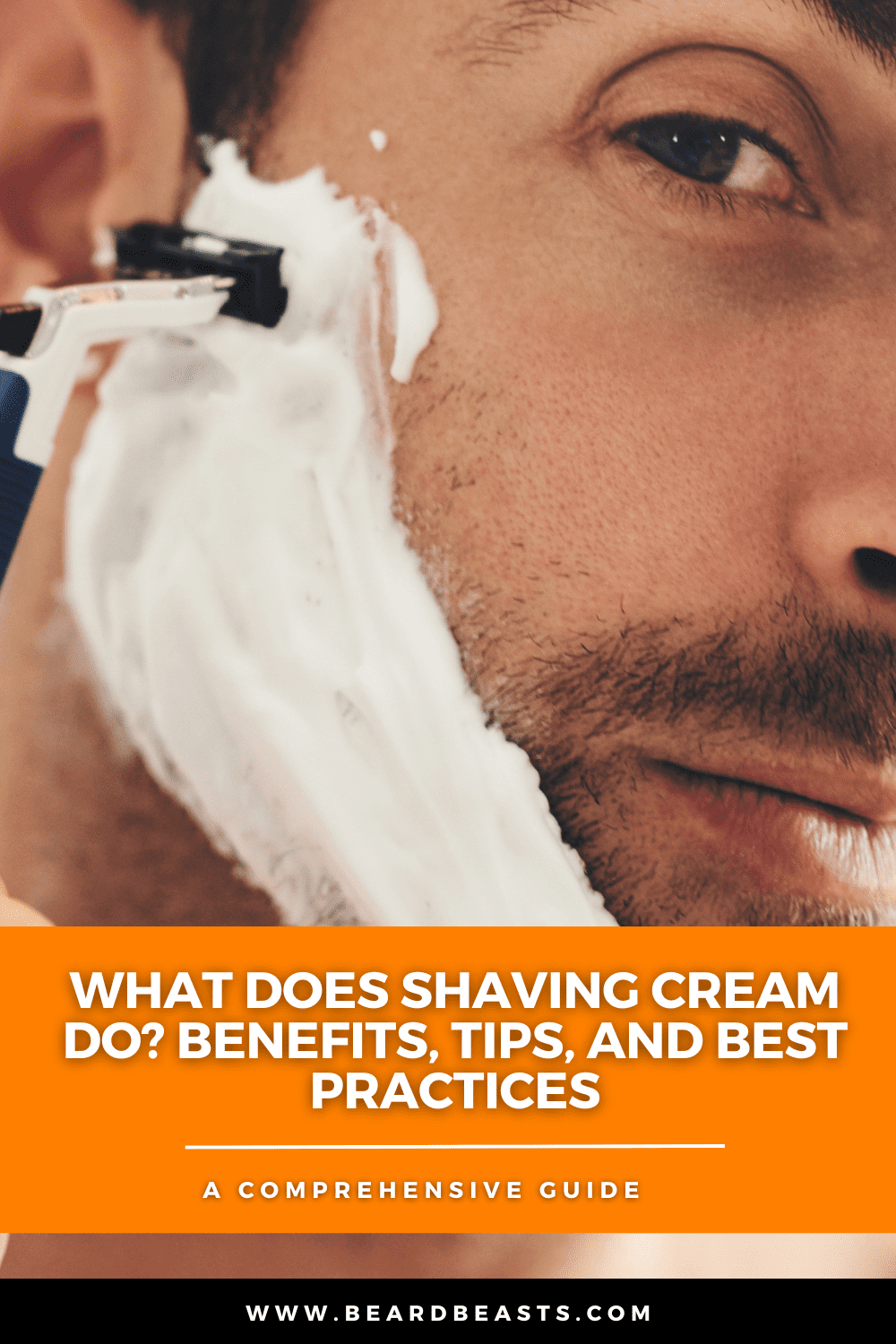
Conclusion
Shaving is a daily ritual for many, and knowing what does shaving cream do can transform your routine from a chore to a pleasure. By now, you’ve learned about the multiple benefits of this product, how to use it effectively, and how to choose the right type for your skin. Let’s recap the key points:
Key Takeaways:
- Softens and Lubricates: This product softens hair and provides the necessary lubrication for a smooth glide.
- Hydrates and Protects: It keeps your skin hydrated and creates a protective barrier to prevent irritation and razor burn.
- Enhances Shave Quality: Using shaving cream results in a closer, more comfortable shave.
- Tailored Choices: There are various types of shaving creams and alternatives, each suited to different skin types and preferences.
Final Thoughts
This product is more than just a foamy product—it’s an essential tool that ensures you get a clean, close, and comfortable shave every time. By choosing the right shaving cream for your skin type and applying it correctly, you can significantly improve your experience and skin health.
So, next time you wonder, what does shaving cream do, remember that it’s your best ally for a smooth, irritation-free shave. Happy shaving, and may your skin always be smooth and refreshed!


